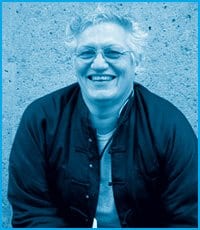Gay community leaders are concerned that the Vancouver Police Department may be about to take a huge step backward in relations with the gay community.
At issue is the year-old gay-programs coordinator, a position created by Det Roz Shakespeare and repeatedly pointed to by the police department as proof that they’re serious about improving policing in the queer community.
Shakespeare, a transgendered lesbian, is retiring Nov 30-along with over 100 other officers-because of a controversial decision of the Municipal Pension Board. But she promised the gay community she would give the position two years of her time and so has offered to come back for a year working on special contract.
Before leaving for an Oregon vacation, Shakespeare told Xtra West Nov 20 that Deputy Chief Bob Rich had decided that signing a contract with her “didn’t meet the force’s mandate, for whatever reason.”
The apparent decision swung some gay leaders into action as they demanded a reversal.
Rich is now on vacation and unavailable for comment.
But Insp Dave Jones, who has supported signing the contract with Shakespeare, says that he and his replacement (Jones is retiring Nov 28), Insp Val Harrison, both “understand that, in every way, the community views this as the show of faith. We get it in spades. Whether or not we can fix it? I suspect we can.”
Jones says he hopes the force will see its previous decision as a “misapplication of criteria” used to choose which retiring officers will be hired back on contract for the next year as the force attempts to cope with the mass retirement of senior officers exacerbating an already existing shortage of police.
The police union is understandably reluctant to give its blessing “to contract out paid work,” says Harrison. “The union asked us to focus on on-line staff positions.” But Shakespeare’s position is sufficiently important that an exception should be made, says Harrison, who insists no final decision has yet been made.
She hopes a compromise can be made that will allow Shakespeare to continue working. And she’d like to see a positive decision by the end of the week “so everyone can plan their lives.”
For her part, Shakespeare says she’s “disappointed” with the first decision and will be available if the department changes its mind. “I was told all along that it’s a no-brainer. Police departments as far away as Australia were contacting us about [the position].”
Shakespeare says she needs another year to bring to fruition two important projects: officer training about the queer community, and the “safe haven” storefront block watch program that will provide refuge to people feeling unsafe.
Jim Deva, president of the Davie St Community Policing Centre (CPC) insists that Shakespeare be contracted or another person hired to continue the liaison position.
“Roz has been a godsend,” he says. “She’s changed the feel of the (CPC) office and the importance of the office. I’m going to do everything in my power to see she keeps her job.”
Shakespeare’s projects must be allowed to develop, says Deva. And the gay-programs coordinator position must be made permanent. If Shakespeare cannot be put on contract, another queer officer must be found to continue staffing the position.
Shakespeare helped solve several important crimes against the gay community in her year on the job, says Deva, as well as starting her projects.
Vince Marino, who represents the gay community on the police chief’s diversity committee, says that with the retirements and impending shortages, senior police management is “very confused about what they’re doing. We need to start to unconfuse them.”
After the murder of Aaron Webster in November 2001, police committed to work with the gay community to solve the murder and to improve police-community relations. While police made little progress addressing some of the issues raised at community meetings-such as increased police presence in the West End during peak gaybashing times-they pointed to the gay-programs liaison position as proof that they were serious about addressing issues of concern to gays.
If that position is not continued “we’re back to square one,” says Deva. “It’s important we build trust. It’s something Shakespeare did very very well; she’s become a bridge between police and the community.”
The gay community’s lack of response to the August murder of Edgar Leonardo is proof that there’s a long way to go in police-community relations, says Deva. He’s had gay men contact him to talk about Leonardo’s cruising patterns rather than contact police with the valuable information. The same thing happened in Webster’s killing.
“I still firmly believe there’s someone on the loose looking for victims. There’s a murderer out there working our community” and that requires that the VPD create a special position to build trust, says Deva. “If Shakespeare’s gone, I don’t know who the hell I’m going to refer people to. Val Harrison? I don’t think so.”
Deva says he remains optimistic of a quick and positive decision on Shakespeare’s position. “I think we’re at the stage of quiet compromise and negotiation to get her position back. If that fails, we’ll bring out the community activism. Let’s start with quiet rational compromise.”
If that doesn’t work, it’s time to take to the streets.

 Why you can trust Xtra
Why you can trust Xtra


